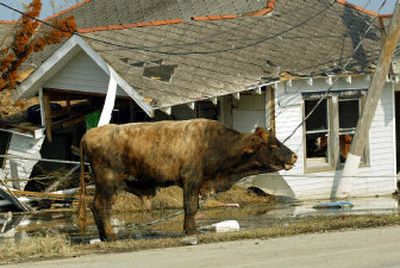Katrina may cut tariffs

WASHINGTON — The Bush administration said Monday it is considering reducing high tariffs imposed on such items as lumber from Canada and cement from Mexico if building needs from Hurricane Katrina cause prices to spike.
Treasury Department spokesman Tony Fratto said the administration has the executive authority to reduce the tariffs to meet special needs. The tariffs have been in place for a number of years since the U.S. lumber and cement industries won cases accusing importers of selling those products in this country at unfairly low prices, a practice known as dumping.
“The government has the authority to adjust the tariffs in an emergency situation, but no determination has been made yet,” Fratto told reporters.
The Bush administration has taken a number of actions aimed at limiting the economic damage of the country’s worst natural disaster after being heavily criticized for an initially slow response.
Imports from Canada of softwood lumber, used in home construction, face penalty tariffs that average 27 percent. Those tariffs were put in place at the urging of the domestic lumber industry, which contended it was losing thousands of jobs because of unfair subsidies provided to Canadian lumber.
Penalty tariffs on imports of Mexican cement include a 54.97 percent levy on shipments from Cemex, the country’s biggest cement producer.
Fratto said the administration will not make a determination on adjusting the tariffs until it has more information on whether prices of building products are being affected by Katrina.
“Obviously, if there are severe price spikes and severe shortages, we would want to take a look at whether a government response” was needed, Fratto said.
Builders have long complained that these duties are not justified and act as a tax on American homeowners and businesses by driving up the cost of construction.
“We’re going to have a lot of additional demand for materials, both in the cleanup process and the repair process and going forward in rebuilding,” said Michael Carliner, an economist for the National Association of Home Builders. The group contends that the softwood lumber tariffs raise the cost of the typical new home by more than $1,000.
Carliner cited an estimate from the American Red Cross that as many 340,000 homes were destroyed by Hurricane Katrina, the largest number of homes ever destroyed by a hurricane in the United States.
Before Katrina hit, the Associated General Contractors blamed the penalty tariffs on Mexican cement for driving up prices by $30 per ton and leading to cement supply shortages in 32 states.
Ken Simonson, chief economist for the contractors group, said Katrina “pretty well qualifies as an emergency, so I hope there is some statutory relief possible.”
However, Joseph Dorn, attorney for the Southern Tier Cement Committee, a group representing 23 U.S. cement producers, said inventories of cement were currently rising because many construction projects in the devastated areas had been halted. His group does not expect price spikes in the months to come, Dorn said.
The administration has created a rebuilding task force that includes the departments of Treasury, Commerce and Labor.
Earlier Monday, Commerce Secretary Carlos Gutierrez urged business leaders to invest in the Gulf Coast, saying the private sector must play a major role in rebuilding.
In a speech at the U.S. Chamber of Commerce, Gutierrez said businesses should look at the region as an economic opportunity.
“I hope businesses will consider investing and locating enterprises in the rebuilding zone,” he said. “Only then will the region be truly reborn.”
Gutierrez praised the charitable contributions being made by corporations and said businesses could use the Commerce toll-free number — 1-888-4USADOC — to make sure that corporate donations get to the places where they can be best used.
Separately, the Labor Department announced Monday that it was creating a Web site — www.jobsearch.org/katrinajobs — to help people who have lost jobs due to Katrina find new work.